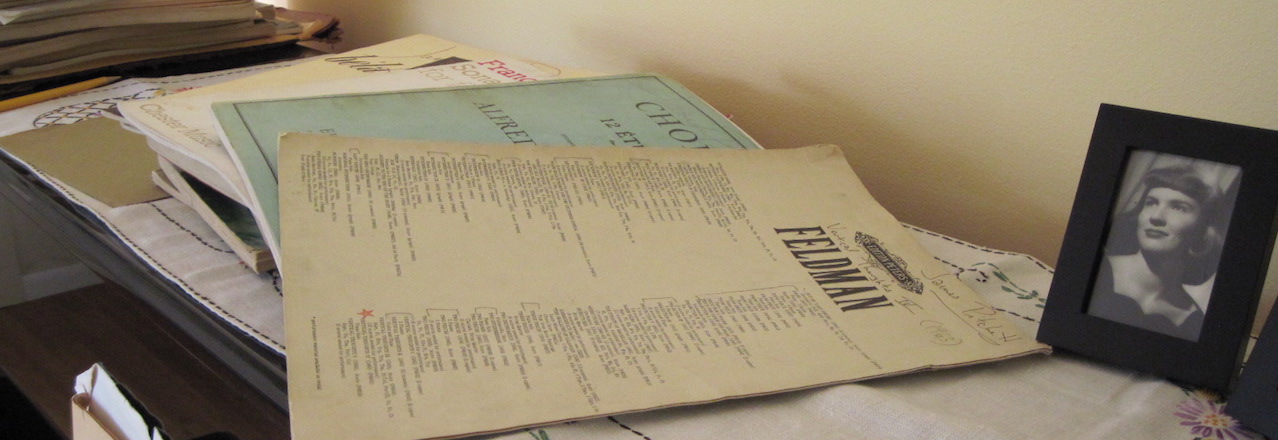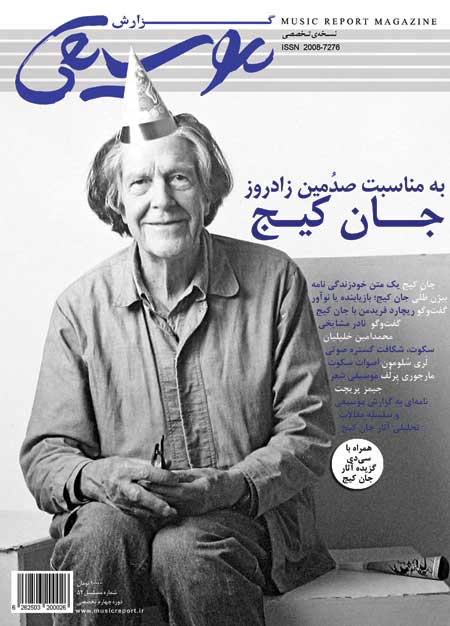This being the John Cage centennial year, I have been receiving a number of requests in my e-mail lately. Sometimes for permission to reprint texts, sometimes to give a lecture, sometimes just a performer wanting some advice on how to interpret a particular score. I respond to all requests, but was particularly interested in the following query:
Dear Mr. Pritchett,
I am Soroosh Riazi, editor-in-chief of a monthly music magazine, named “Music Report”, published in Iran. I am going to publish a special issue about John Cage. The translation team of our magazine has translated some of your writings to Persian and these translations will be used in our Cage issue. I will be grateful if you may write a short text for readers of this issue. I will send you an issue in token of keepsake.
Best Regards,
Soroosh Riazi
It probably says a lot about the USA’s image of Iran that I was so surprised to hear that there was an interest in John Cage there. I went to the Music report website, which of course is in Persian, so while it looked beautiful, I couldn’t understand much (Google Translate helps). In the ensuing correspondence with Soroosh, I found out that they have translated quite a number of the articles from my website and will be publishing them in the Cage issue. I look forward to seeing “John Cage was a composer” in Persian script. (Update: The issue (#34) has now been released. More details on the Music report website.)
For the new text, we thought of doing it as an interview, and Soroosh sent me a number of questions. They touched on a number of issues relating to spirituality, religion, and critical reception, including:
- Is it necessary to learn Buddhism and other philosophies if someone wants to create a work of art according to thought of Cage?
- Apart from China and India, did Cage probe other philosophies in the East range, such as Middle East, Iran (for example Hafez, Maulana Rumi, Omar Khayyam)
- Concerning Cage’s doctrines and specially his belief that sounds are divine impacts which are perceived through nature, can we imagine that Cage was affected by religious thoughts?
- It seems that presenting Cage’s music can be attractive for addressees just in a performance way and it would not aurally be so desirable for many people and even the elite. So can we basically consider this art as a performance art?
Rather than answer them one by one, I decided to write a short letter to the readers of Music report that covered most of the questions in one way or another. Soroosh caught me ducking a couple of the questions and asked for revisions to include them, which I did. I like the original version better as a text, though, so that’s the one I’m posting here.
While working on this, I was keenly aware of the tensions and animosity between the governments of our two countries. As it happens, I was in the middle of reading Scott Peterson’s hugely informative book on modern Iran, Let the swords encircle me when I first heard from Music report. Peterson eloquently points out the similarities between the USA and Iran, even as he shows the potentially lethal frictions between the countries. Part of my intent was, as hokey as it sounds, to make a personal connection between this American and Iranian musicians that will demonstrate the goodwill always available to people, if not always to their governments. People inhabit a much larger world—and I like to think a much kinder world—than governments do.
Update: Alex Ross reminds me that he reported on “Cage in Iran” back in 2007. Scooped!


Dear James, excellent website – I have been looking in frequently since you started up. I am a writer and a development regarding Feldman made me think of you. Please would you contact me via email for more information. Thank you. j/
Pingback: Places I’d take Michael Finnissy to if he ever visited Iran – Hossein Hadisi